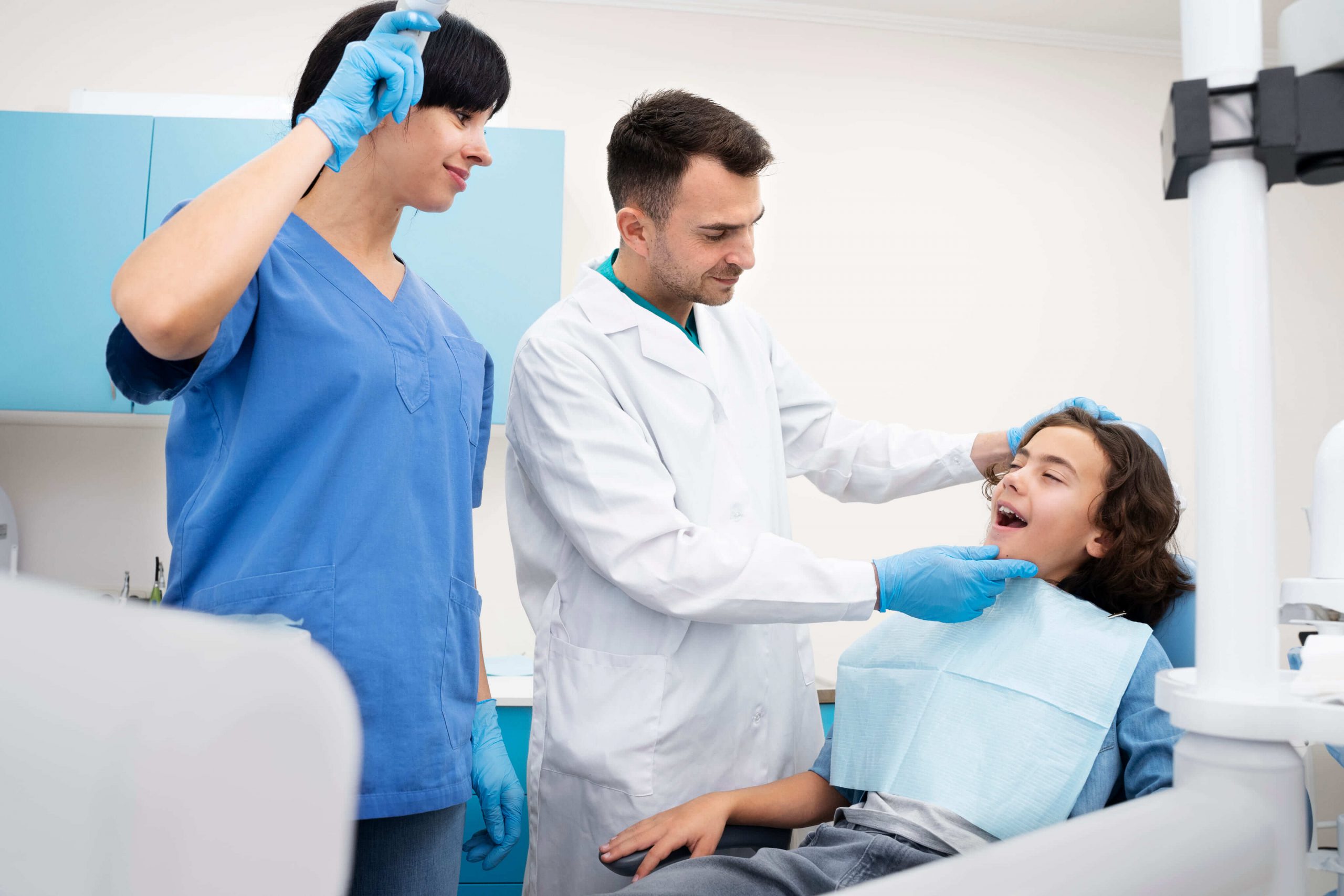
Is it Normal to Have TMJ Pain After Braces?
Yes and No. Orthodontics does not normally cause TMJ disease per se. But anytime teeth are moved around and there are changes to the bite, tongue and airway spaces, the result can be TMJ pain, teeth clenching, mouth breathing and poor sleep. People who need braces normally have more problems than their teeth not being straight. Crowed and crooked teeth is the writing on the wall that functional problems exist with the tongue, mouth, jaw and airway spaces.
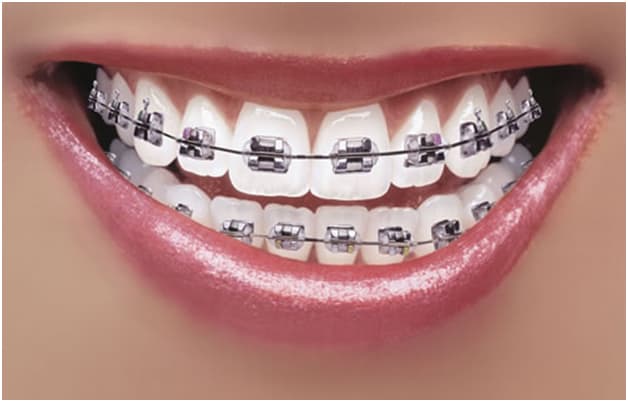
braces expanders 1
TMJ after braces orthodontics
If braces are used to close spaces between teeth, the result is TMJ, teeth clenching and a bad bite. The problem is the teeth are too small, but the jaw/dental arch is the correct size. The correct solution is to widen the teeth with cosmetic dental veneers. Veneers made of porcelain are the equivalent of adding enamel to the teeth to widen them. The root cause of this problem is the teeth being too narrow, so the functional solution is to widen the teeth to the width the teeth should be. Some people are born with teeth that are too small. It is called “mircodontia.”
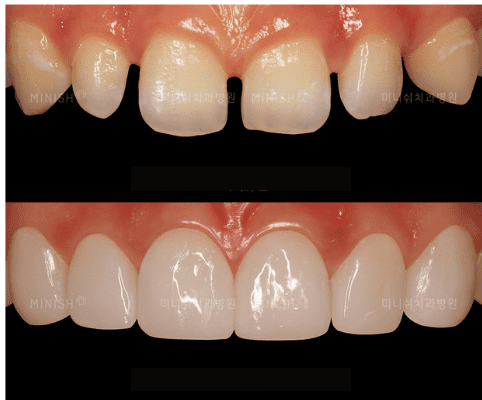
teeth spaces braces veneers
Closing Spaces Between Teeth with Braces Causes TMJ
If the spaces are closed with invisalign or braces, the result is dragging the teeth back into the mouth to close the space. Orthodontic space closure, reduces the size of the mouth and dental arch. The result is crowding of the tongue space and pushing the tongue back closer to the throat. This usually results in teeth clenching and TMJ pain. Space closure with braces is also not stable. Once the teeth are squished together, the spaces will open back up. Usually what happens, is the tongue will push the teeth back out and the spaces will re-open.
Braces for Crooked Lower Teeth Causes TMJ Pain
The issue with crooked teeth is not having enough space for all the teeth to fit. This is like having too much furniture in a small room. You can rearrange the furniture but it still wont fit. Braces will around drag the teeth around and back into the mouth. Braces move teeth. Moving the teeth back crowds the tongue and causes a bad bite. The result will be sore muscles, jaw joints and TMJ pain.
The case needs a dental expander such as a Homeoblock appliance or Schwarz device. Invisalign also has a program for expansion. Expansion adds more time and money to treatment. So sometimes short cuts will be take with braces, shaving teeth called (IPR or interproximal reduction). IPR is an acronym for shaving you teeth down in between teeth to make them narrower to create space. The better solution is to create more room so all the teeth can fit. Mouth expanders increase the size of the mouth. The dental arch needs to get bigger so all the teeth can fit. More space can be found by dragging the teeth back or leaning them out, but that crowds the tongue and causes poor sleep and teeth clenching. The proper way to correct crowding is to expand the arch and then straighten them. Some expanders can straighten the teeth and expand at the same time such as a Schwarz Expander and Invisalign (when used properly).
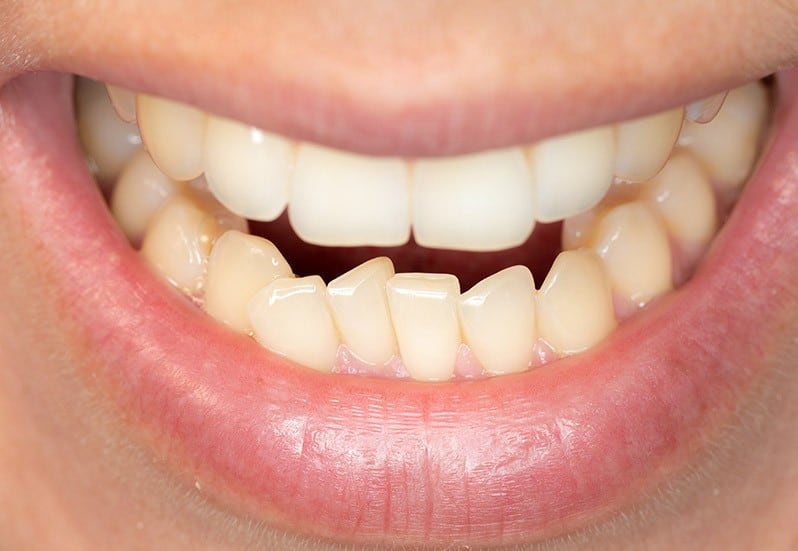
teeth crowding braces tmj
Removing teeth for Braces causes TMJ Pain and Mouth Breathing
In some cases, teeth will be extracted to create room for straight teeth. Dental extractions and retraction causes TMJ and poor sleep almost 100% of the time. It may not happen right way, but it does. Extractions also shrinks the size of the facial profile, causes forward head posture and a bad bite by decreasing the height of the bite. When teeth are removed and retraction is performed, the tongue is brought too close to the throat. This causes airway resistance, mouth breathing and sometimes even sleep apnea.
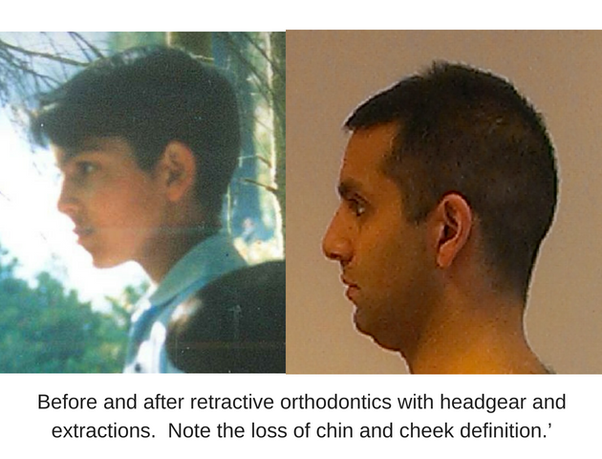
remove teeth braces never
What Causes TMJ and What are the Treatments for TMJ Video
But what is the root cause of teeth crowding? And why why do people clench their teeth and have TMJ pain?. If these questions can be answered, the problem can be resolved. Just because the teeth have been straightened does not mean everything else in the mouth and jaws have been optimized. The teeth should line up top to bottom and fit well. There should be enough room in the mouth for the tongue to function properly. There should be enough space in the mouth and the lower jaw should be positioned forwards where the tongue does not back up into the airway.
Learn more about the connection between the mouth, airway, teeth occlusion and clenching.
How do Conditions in the Mouth Influence TMJ Dysfunction:
- Breathing – Breathing is one of the primary things that happens in the mouth. When the mouth is too small, space for the tongue is crowded and the tongue can become displaced into the throat and get in the way of proper breathing function. This activity at night causes teeth clenching at night.
- Talking – believe it or not, when things are not right in the mouth there can be speech problems.
- Tongue function – when the tongue is crowded or crooked teeth are in the way, there can be issues with proper tongue function and swallowing
- Swallowing – improper swallowing can lead to tongue thrusts the push the teeth around and cause instability. A retainer will not hold everything.
- Smiling
- Head Posture – the relationship of the upper and lower jaw has everything to do with posture. Long story.
Why do People get Braces and Invisalign?
When people are asking for braces there is usually a reason such as tooth crowding, cooked teeth, teeth not lining up and biting properly. These problems are usually complaints about how things look and feel. Braces can be used to get teeth straight, but do not always correct all the other functional dental problems. These same issues can lead to TMJ pain, teeth clenching, bruxism and even sleep apnea. Upper Airway Resistance Syndrome (UARS) is another common airway problem at night related to the spaces in the mouth.
How Can Braces contribute to TMJ Problems?
When Braces are removed, the teeth may be too far back in the mouth and not allow enough room for the Tongue. The Tongue can be displaced into the throat especially at night and get in the way of night time breathing. Braces can change the size and shape of the upper and lower jaws-that is hold the outward growth of the face back from happening. Worse, braces can be used for retraction or backward movement of the jaws and teeth-this is bad almost every time. Often times, braces will not correct a bad bite completely and the use of expanders or even surgery may be necessary. The Vivos DNA appliance is the best appliance for TMJ disorders, Sleep Apnea and UARS problems in adults. The ALF dental appliance is the best appliance for tooth crowding and small jaws in children. ALF vs DNA dental appliance.
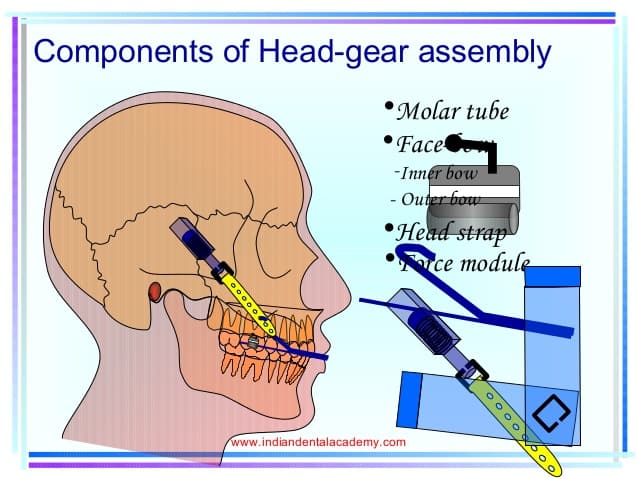
palatal expanders2
Can Smile Direct Club cause Bruxism and TMJ?
Since Smile Direct Club is performed done by a licensed dentist, it has the greatest chance of causing a bad bite and TMJ problems. The treatments are cheap and full of shortcuts. You get what you pay for and not anymore. Maybe less. The most common TMJ problems we see from Smile Direct and Evenly are retraction to close spaces in cases of microdontia. And correction of dental crowding by IPR and retraction. These two modalities reduces the size of the mouth and crowds the tongue. The result is airway resistance, mouth breathing, teeth clenching and TMJ.

 (301) 421 1996
(301) 421 1996 burtonsvillesmiles@gmail.com
burtonsvillesmiles@gmail.com